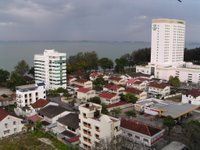
George Town (now Georgetown City) was so named by Francis Light on 10th August, 1786. Francis Light had occupied Penang Island or Pulau Pinang in Malay from the Sultan of Kedah on 17th July, 1786. Francis Light, for a fact, cheated the Sultan into handing over the island to the (English) East India Company.
In 1800, a Committee of Assessors was formed and years later, from this evolved the fully elected Municipal Council. Yes they do have elections for the local council and not appointed, including among family members, as can be seen in many states today.
The Committee of Assessors was tasked to fix a valuation on every particular house and that so much percent on that valuation be levied. Today, we refer to it as assessment tax.
The British Municipal Corporations Act of 1835 had no counterpart in the then Straits Settlements until Act No XII was passed on 29th April, 1839. Repealing Regulation of 1827, this Act, applying to George Town, Singapore and Melaka, within Municipal limits.
Among others, the Act provided for all dwelling houses to be assessed and a tax be levied not exceeding 10 percent of the annual value. It also imposed a tax on all carriages, carts and draught animals, providing that vehicles should also be numbered and registered.
Out of the funds collected from the assessment and taxes leviable under the Act, provisions were made to maintain roads and thoroughfares and lighting, to contruct bridges and other necessary purposes for the comfort and protection of the inhabitants of the incorporated settlements.
What the Act did was probably to legalise what was already being done. It provided a source of income and defined the objects of expenditure - what it did not do was to establish a Municipal Council. Far from that, it vested all appointments in the Chief Civil Officer and placed all the business of collection under his superintendences.
Section XII of the draft Municipal Act of 1846 empowered the Civil Authority of the Settlements to appoint a Municipal Committee to consist of five resident ratepayers, two of them to be government officers, and charged this committee with responsibility for enforcing the Act. The draft Act also established a Municipal Fund, from which police expenses would be paid.
In 1856, a provision was added to appoint Municipal Commissioners of Prince of Wales Island, a body incorporated and have perpetual succession and common seal, and by such name shall sue and be sued. The British Resident was an automatic commissioner known as Resident Councillor, the governor to appoint one and three others to be elected by the ratepayers. The Resident Councillor was to be the President of the Commissioners or the head of the local authority.
On January 1, 1957 Queen Elizabeth II upgraded George Town Municipal Council to the nation's first City Council. Prior to that, in December 1956 the first ever fully elected City Council was held. At its first meeting held on January 2, 1957, lawyer G.H. Goh (Alliance party) was elected President defeating D.S. Ramanathan (Labour Party). Ramanathan was elected as mayor, a post created by an amendment to the Constitution on the 23rd December by the State Legislature.


No comments:
Post a Comment